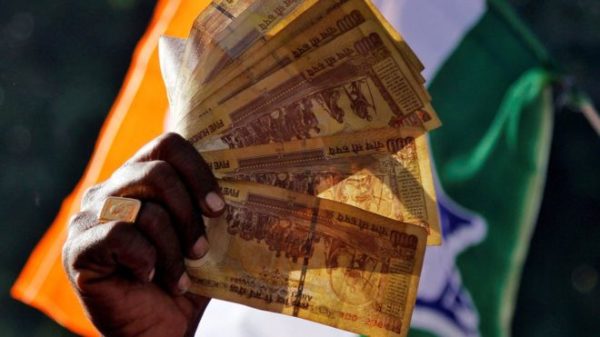India’s controversial withdrawal of high value banknotes late last year has had an “adverse impact” on the economy, the government has admitted.
The country’s Economic Survey, released on the eve of the national budget, said the measures had slowed growth.
The dramatic move to scrap 500 ($7.60) and 1,000 rupee notes was intended to crack down on corruption and so-called black money or illegal cash holdings.
But it also led to a cash shortage, hurting individuals and businesses.
The report forecast that India’s economy would grow 6.5% in the year to March 2017, down from 7.6% the previous financial year.
But it also stressed that the estimate was based “mainly” on data from before the note withdrawal kicked in – causing some to suspect growth may be lower still.
India’s Finance minister Arun Jaitley who will deliver the Union budget in Delhi on Wednesday, said he expected the economy to “revert to normal” from March onwards after supplies of cash in the economy were replenished.
‘Reduced demand’
Prime Minister Narendra Modi announced the so-called “demonetisation” policy on November 8 last year.
Within hours the two notes were no longer accepted as legal tender – taking the equivalent of about 86% of India’s cash supplies out of circulation and sparking scenes of chaos outside banks and cash machines.
Low-income Indians, traders and ordinary savers who rely on the cash economy were badly hit, with hordes thronging banks to deposit expired money and withdraw lower denominations.
“The adverse impact… on GDP will be transitional”, the government’s chief economic adviser, Arvind Subramanian, wrote in the report.
“Growth slowed as demonetisation reduced demand … and increased uncertainty,” he added, saying negative impacts included including job losses and falling income for farmers.
However the report said the scheme could be “beneficial in the long-run” if corruption fell and there were fewer cash transactions – many of which are done to dodge taxes.
‘Acknowledgement’
The government has previously said the move was a success with the banks flush with cash and significant increases in tax collection.
“It’s very nice to understand that the survey is acknowledging the negative impact,” said Aneesh Srivatava, chief investment officer at IDBI Federal.
“This is perhaps the first acknowledgement coming from the government. Otherwise so far there has been a denial.”
Deadlines for spending the notes or swapping them for new currency have already passed.
Some people, including those of Indian origin living abroad, will be able to exchange the notes in branches of India’s central bank until 31 March 2017 – but the process will be more complicated than going to a regular bank.






Leave a reply